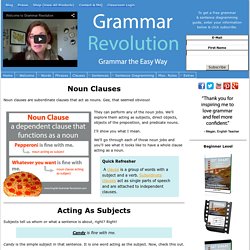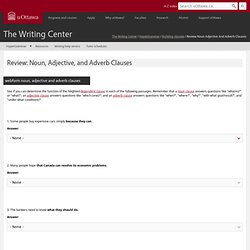

Noun Clauses - English Grammar and Writing. Noun Clauses. Noun Clauses Are Subordinate Clauses. Noun clauses are subordinate clauses that act as nouns.

Gee, that seemed obvious! Subjects tell us whom or what a sentence is about, right? Right! Candy is the simple subject in that sentence. It is one word acting as the subject. Whatever you want is fine with me. Woo! Whatever you want is a noun clause acting as the subject of the sentence. We know that whatever you want is a clause because it has a subject (you) and a verb (want). We also know that it is a subordinate clause because it does not express a complete thought. Here is an example of how you would diagram a noun clause acting as the subject.
A noun can also be a direct object. Can you tell me the time? Time is the direct object in that sentence. Can you tell me when it is time for dinner? When it is time for dinner is now acting as the direct object. Let's see if when it is time for dinner is really a noun clause. Does it have a subject and a verb?
Advanced Grammar: Noun Clauses. Identify the noun clause exercise. Az Review: Noun Clauses. Clause_noun. Noun Clauses Practice 1. Noun Clauses - GrammarBank. Noun Clause Exercise. Noun clauses. Exercise - Noun clauses 2. The Writing Center. If a clause can stand alone as a sentence, it is an independent clause, as in the following example: Independent the Prime Minister is in Ottawa Some clauses, however, cannot stand alone as sentences: in this case, they are dependent clauses or subordinate clauses.

Consider the same clause with the subordinating conjunction "because" added to the beginning: Dependent when the Prime Minister is in Ottawa In this case, the clause could not be a sentence by itself, since the conjunction "because" suggests that the clause is providing an explanation for something else. Adverb The committee will meet tomorrow. adverb clause The committee will meet when the Prime Minister is in Ottawa. Dependent clauses can stand not only for adverbs, but also for nouns and for adjectives. The Writing Center. See if you can determine the function of the hilighted dependent clause in each of the following passages.

Remember that a noun clause answers questions like "who(m)? " or "what? "; an adjective clause answers questions like "which (one)? "; and an adverb clause answers questions like "when? ", "where? " 1. Oops! Answer: The answer noun clause is not correct. Explanation: This clause answers the question "why," showing cause, so it is an adverb clause. ESL: English grammar quiz - Noun Clauses 1 - Practice using noun clauses in English.
Nominal (Noun) Clause Quiz. Noun Clauses: Embedded Questions - An English-Zone.Com Mini-Lesson and Quiz. ESL: English grammar quiz - Noun Clauses 1 - Practice using noun clauses in English. Noun clause practice. Noun clauses.